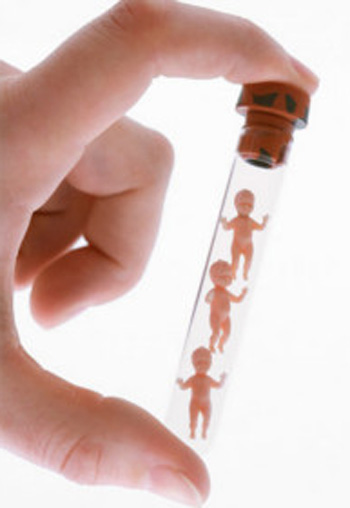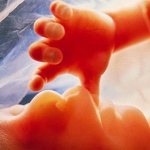Overview
IVF, or in-vitro fertilisation, is one of many artificial reproductive technologies now used to assist infertile couples and individuals conceive a child.
IVF was developed in the 1970’s. The first ‘IVF baby’ was born in 1979. Original techniques involved mixing eggs (ova) taken from a woman’s ovary, and sperm, collected from the man through masturbation, in a laboratory dish. The human embryo’s that developed ‘in-vitro’ (which simply means “in glass”) are transferred into the woman’s uterus with the goal of establishing a pregnancy. This is called embryo transfer. Normally, many eggs are fertilised and the “healthiest” one is implanted in the woman. The rest are destroyed (these are abortions!). Sometimes, the fertilised eggs are frozen for later use.
There are many other associated techniques such as artificial insemination, intra-cytoplasmic sperm injection, cryopreservation, pre-implantation genetic diagnosis, egg sale, egg/sperm donation and paid/voluntary surrogacy.
IVF is increasingly popular and available worldwide. It is a multi-billion dollar fertility industry. While previously offered only to infertile couples, it is now offered to individuals, same-sex couples, surrogates and women without a diagnosis of infertility in some countries. Additional services such as pre-implantation genetic disease diagnosis and sex-selection are also increasingly available.
Supporters see it as a modern day miracle, with growing potential. The main critics argue that it is unethically money driven, immoral, unsafe in the long-term, contrary to the unique value of individual human life and denying people the right to be conceived naturally between a loving couples.
Common arguments
made in support of IVF
made in support of IVF
- Helping Infertile Couples – IVF enables otherwise infertile people to have a child. This is regarded by many as a basic right – the right to bear children.
- Every IVF child is a wanted child. Unlike children born in difficult or unwanted pregnancies, all of these children have been carefully planned and are thus more likely to enter a fulfilling and supportive family life.
- The science that allows IVF is ground breaking and gives infertile people opportunities they didn’t have before. Furthermore, with choosing of embryos and testing for genetic abnormalities before implantation we can prevent unwanted children with diseases or poor quality of life being born.
- If need be, surrogacy should also be allowed as an option for those unable to carry a pregnancy as long as it is freely agreed upon. If adults are consenting to ‘shared’ parenting arrangements, then there is no problem.
- Embryos are not people. The excess embryo’s that are created and later discarded in the IVF process are only ‘potential’ human beings.

Why IVF Is Not the Answer
Children are a gift, not a right. Whilst we can understand the deep desire of many infertile couples to conceive, we also realise that even with the best science this may not be possible.
This is why procreation should not be separated from marital sex. Making babies in test-tubes has the same ultimate outcome as conceiving naturally. But removing the natural part of the process changes marital sex. It devalues it. The Catholic view of sex is not easily explained in a world that has seen ‘sex on demand’ for so long. Ultimately, to ‘restore the balance’ sex needs to be between committed couples that are open to having children. Otherwise it can become misused and abused. Likewise the Catholic view of humanity is that we need certain qualities to live to ‘flourish’ as individuals and society. One such quality is the need for all to be the product of a loving marital union.
Embryos are human beings and deserve to be treated as such. In every IVF cycle, many embryos are usually discarded (sometimes after being in cold-storage for some time). A truly philosophical view of these embryos says that whilst only made up of a few cells, they carry all the potential to become just like you and I if given time and nourishment. In the Catholic view, we cannot morally separate them from a grown human being, much in the same way that we do not give greater value to an intelligent independent adult over a helpless sick newborn child.
IVF is not the golden solution to all our reproductive woes. Without delving into finer details, it suffices to say that it is a long, painful and costly process that puts both the mother and child at significant risk. We also have little real knowledge of the long-term impacts IVF and related reproductive technologies will have on genetics, genetic diseases, fertility and our social fabric.
There are alternatives. Both medical treatments, such as NaPro Technology (Natural Procreative Technology) and non-medical approaches such as the option of fostering or adopting children.
If we instead use artificial means to create children for couples, why not allow individuals to have babies if they want one? Indeed the IVF industry is promoting surrogacy and offering IVF to single people and same-sex couples. The child has become a commodity, not the loving product of a committed (married) couple.
For many, the Church’s teaching is difficult to bear because the desire to have children is so natural and strong. So fundamental has the concept of reproduction remained throughout human existence, all major belief systems seem to reserve special provisions for it. Indeed, infertility is not a new thing and was certainly common even in antiquity. The Catechism of the Catholic Church highlights this point:
Couples who discover that they are sterile suffer greatly. “What will you give me,” asks Abraham of God, “for I continue childless?” and Rachel cries to her husband Jacob, “Give me children, or I shall die!”
On IVF, the Catechism of the Catholic Church notes:
Techniques involving only the married couple (homologous artificial insemination and fertilization) are perhaps less reprehensible, yet remain morally unacceptable. They dissociate the sexual act from the procreative act. The act which brings the child into existence is no longer an act by which two persons give themselves to one another, but one that “entrusts the life and identity of the embryo into the power of doctors and biologists and establishes the domination of technology over the origin and destiny of the human person. Such a relationship of domination is in itself contrary to the dignity and equality that must be common to parents and children” (Congregation of the Doctrine of Faith, Donum Vitae II, 5). “Under the moral aspect procreation is deprived of its proper perfection when it is not willed as the fruit of the conjugal act, that is to say, of the specific act of the spouses’ union …. Only respect for the link between the meanings of the conjugal act and respect for the unity of the human being make possible procreation in conformity with the dignity of the person” (Congregation of the Doctrine of Faith, Donum Vitae, II, 4).
Famous Quotes
“It would on the one hand be illusory to claim that scientific research and its applications are morally neutral; on the other hand one cannot derive criteria for guidance from mere technical efficiency, from research’s possible usefulness to some at the expense of others, or, worse still, from prevailing ideologies. Thus science and technology require, for their own intrinsic meaning, an unconditional respect for the fundamental criteria of the moral law: that is to say, they must be at the service of the human person, of his inalienable rights and his true and integral good according to the design and will of God.(7)
Further, it is beautifully pointed out that, “The child is not an object to which one has a right, nor can he be considered as an object of ownership: rather, a child is a gift, “the supreme gift” (Pastoral Constitution Gaudium et Spes, 50) and the most gratuitous gift of marriage, and is a living testimony of the mutual giving of his parents. For this reason, the child has the right, to be the fruit of the specific act of the conjugal love of the parents; and also has the right to be respected as a person from the moment of his conception.”(Congregation of the Doctrine of Faith, Donum Vitae, II, 8)
Francis Collins (American physician-geneticist noted for his discoveries of disease genes and his leadership of the Human Genome Project): “If you are in support of in vitro fertilization, then you have to recognize that human embryos are being created in excess of what can be used safely to re-implant for a pregnancy. So they’re going to end up being discarded.”

Quick Facts
Artificial Insemination
In artificial insemination, sperm is collected – usually through masturbation – and deposited in the woman’s fallopian tube, where it can fertilise the egg. The process is usually done through a laboratory procedure. This process is used when sperm cannot enter the fallopian tube and it is also done when the sperm is inadequate for some reason. In this case, sperm from a donor is used.
The Catholic Church does not approve of this method as it bypasses the unitive aspect of the marital act and procreation takes place outside natural intercourse. Further, the process almost always involves masturbation (which is immoral: see CCC 2352 ), and violates the right of the child to be conceived through a natural marital act.
Surrogacy
The Catholic Church opposes surrogate motherhood, a process wherein an embryo from one couple is placed in the womb of a second woman and carried to term by her, usually for remuneration. Click here for an excellent overview of why the Church opposes surrogate motherhood.
NaProTechnology
The medical breakthrough of NaPro Technology (Natural Procreative Technology) is a women’s health science that is an effective alternative to artificial reproductive technologies such as IVF.
NaProTechnology presents for the first time a thorough understanding of normal and abnormal menstrual cycles. Dr. Thomas Hilgers, director of the Pope Paul VI Institute for the Study of Human Reproduction, has helped hundreds of couples to achieve a pregnancy without recourse to illicit means. While no couple has a ‘right’ to a child, they should be afforded all the means licit and available to help them achieve a pregnancy to the extent possible.
How many babies have we lost?
During the annual meeting of the European Society of Human Reproduction and Embryology in July 2012, it was announced that five million babies have been born following in vitro fertilization procedures since 1978. Today, approximately 350,000 IVF babies are born annually, and the numbers are increasing.
In July 2011, Britain’s Human Fertilisation and Embryology Authority announced that for every child born by IVF thirty embryos were created. This means that for a typical couple seeking IVF, somewhere between five and thirty of their children died so they could give birth to one. On a world-wide scale, this means that 30-150 million children have died because of IVF.
Video / Audio
An Introduction to NaProTechnology: An Interview with Dr. Thomas W. Hilgers M.D. Eternal Word Television Network (EWTN) DVD. To order, Contact Us







